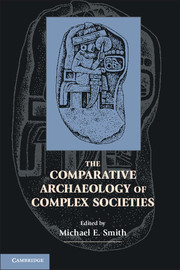Book contents
- Frontmatter
- Contents
- Tables
- Figures
- Contributors
- Foreword
- Preface
- Chapter 1 Comparative Archaeology
- Chapter 2 Approaches to Comparative Analysis in Archaeology
- Chapter 3 Comparative Frames for the Diachronic Analysis of Complex Societies
- Chapter 4 What It Takes to Get Complex
- Chapter 5 Challenges for Comparative Study of Early Complex Societies
- Chapter 6 Patterned Variation in Regional Trajectories of Community Growth
- Chapter 7 The Genesis of Monuments in Island Societies
- Chapter 8 Power and Legitimation
- Chapter 9 The Strategies of Provincials in Empires
- Chapter 10 Household Economies under the Aztec and Inka Empires
- Chapter 11 Low-Density, Agrarian-Based Urbanism
- Chapter 12 Archaeology, Early Complex Societies, and Comparative Social Science History
- Index
Chapter 1 - Comparative Archaeology
A Commitment to Understanding Variation
Published online by Cambridge University Press: 07 October 2011
- Frontmatter
- Contents
- Tables
- Figures
- Contributors
- Foreword
- Preface
- Chapter 1 Comparative Archaeology
- Chapter 2 Approaches to Comparative Analysis in Archaeology
- Chapter 3 Comparative Frames for the Diachronic Analysis of Complex Societies
- Chapter 4 What It Takes to Get Complex
- Chapter 5 Challenges for Comparative Study of Early Complex Societies
- Chapter 6 Patterned Variation in Regional Trajectories of Community Growth
- Chapter 7 The Genesis of Monuments in Island Societies
- Chapter 8 Power and Legitimation
- Chapter 9 The Strategies of Provincials in Empires
- Chapter 10 Household Economies under the Aztec and Inka Empires
- Chapter 11 Low-Density, Agrarian-Based Urbanism
- Chapter 12 Archaeology, Early Complex Societies, and Comparative Social Science History
- Index
Summary
As archaeologists, we seek to understand variation and change in past human societies. This goal necessitates a comparative approach, and comparisons justify the broad cross-cultural and diachronic scope of our work. Without comparisons we sink into the culture-bound theorizing against which anthropology and archaeology have long sought to broaden social science research. By undertaking comparisons that incorporate long-term social variability, archaeologists not only improve our understanding of the past, but also open the door to meaningful transdisciplinary research. Archaeologists have unique and comprehensive data sets whose analysis can contribute to dialogues surrounding contemporary issues and the myriad challenges of our era.
In the past two decades, the pendulum seems to have swung away from comparative research in archaeology. Many archaeologists focus on detailed contextual descriptions of individual cases, and only a few have dedicated themselves to explicit comparative work. Yet in that same time span, fieldwork has expanded tremendously throughout the world, leading to an explosion of well-documented diachronic data on sites and regions. We now have substantial detail on the variation inherent in phenomena such as cultural assemblages, settlement patterns, and economic activity. New methods, from dating techniques to digital data processing, promote comparative analysis and greatly advance our understanding of human societies and change. The time is ripe for a renewed commitment to comparative research in archaeology.
- Type
- Chapter
- Information
- The Comparative Archaeology of Complex Societies , pp. 1 - 3Publisher: Cambridge University PressPrint publication year: 2011
- 2
- Cited by



